《英语》(基础模块)(修订版)第二册第一单元
- 格式:doc
- 大小:3.79 MB
- 文档页数:18
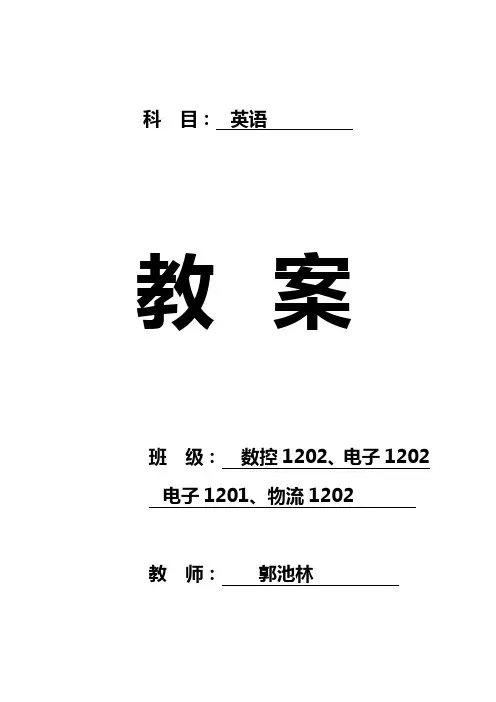
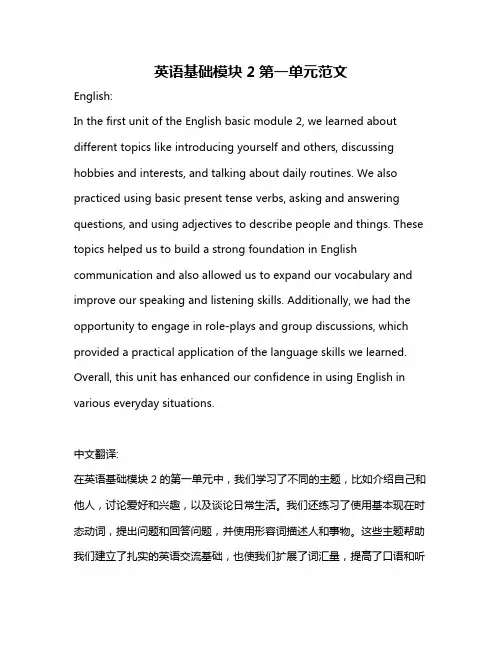
英语基础模块2第一单元范文English:In the first unit of the English basic module 2, we learned about different topics like introducing yourself and others, discussing hobbies and interests, and talking about daily routines. We also practiced using basic present tense verbs, asking and answering questions, and using adjectives to describe people and things. These topics helped us to build a strong foundation in English communication and also allowed us to expand our vocabulary and improve our speaking and listening skills. Additionally, we had the opportunity to engage in role-plays and group discussions, which provided a practical application of the language skills we learned. Overall, this unit has enhanced our confidence in using English in various everyday situations.中文翻译:在英语基础模块2的第一单元中,我们学习了不同的主题,比如介绍自己和他人,讨论爱好和兴趣,以及谈论日常生活。
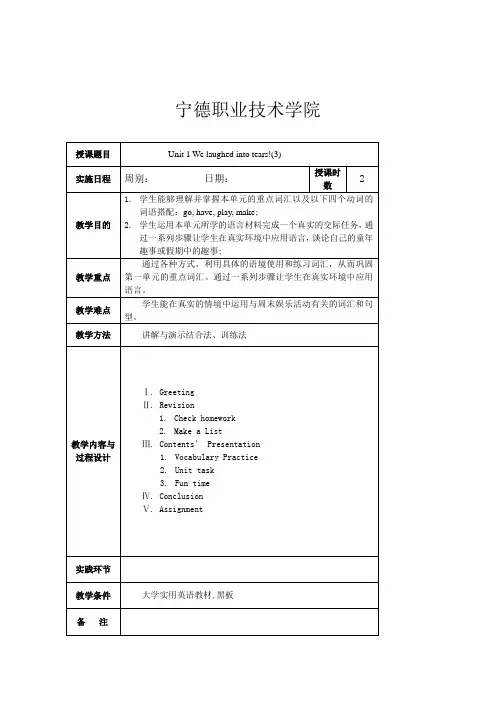
宁德职业技术学院教学过程与内容:Ⅰ. GreetingⅡ. Revision1. Collect the Ss’ homework and get some of them to tell others key phrases of what they will talk today. Get others to guess.S1(Li Jie): went swimming bathed in the sun walked along the beachT: What did Li Jie do last vacation?S2: She went swimming, bathed in the sun and walked along the beach.T: Where did she go?S3 to S1: Did you go to Sanya?S1: No, I didn’t.S4 to S1: Did you go to Qingdao?S1: No, I didn’t. I went to Thailand.T: Who did she go with?S5 to S1: Did you go with your parents?S1: Yes, I did.(设计意图:这一步骤教师既能对学生的作业情况进行及时地检查,教师在并听的过程中边提出问题,并且问题是结合上一课时的知识点,又可以检查学生们对于一般过去时的掌握情况。
教师让说的学生故弄玄虚,不把完整的信息全部告诉大家,更增添了其他同学的好奇心,鼓励学生用上一课时学过的句型进行提问和回答。
教师因此也达到了复习一般过去时的目的。
同时,教师也为下一班即将要进行的表演做了铺垫。
)2. Present the phrases the Ss mentioned and make a list, omitting the verbs.(设计意图:教师把学生所说到的短语,列在一张表格中,把动词省略掉。


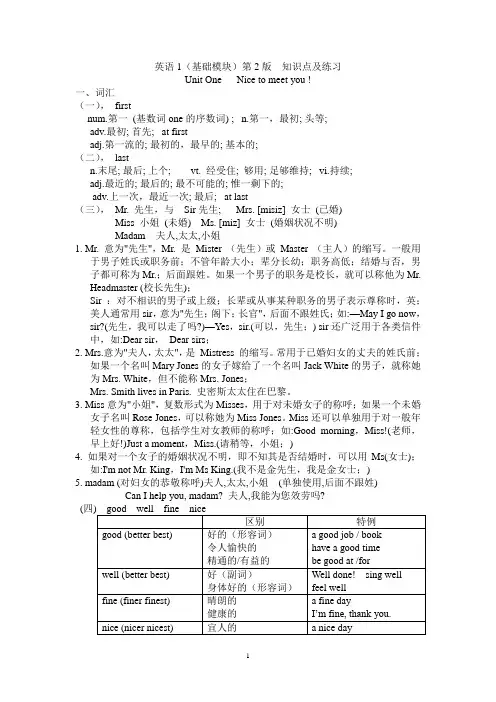
英语1(基础模块)第2版知识点及练习Unit One Nice to meet you !一、词汇(一),firstnum.第一(基数词one的序数词) ; n.第一,最初; 头等;adv.最初; 首先; at firstadj.第一流的; 最初的,最早的; 基本的;(二),lastn.末尾; 最后; 上个; vt. 经受住; 够用; 足够维持; vi.持续;adj.最近的; 最后的; 最不可能的; 惟一剩下的;adv.上一次,最近一次; 最后; at last(三),Mr. 先生,与Sir先生; Mrs. [misiz] 女士(已婚)Miss 小姐(未婚) Ms. [miz] 女士(婚姻状况不明)Madam 夫人,太太,小姐1. Mr. 意为"先生",Mr. 是Mister (先生)或Master (主人)的缩写。
一般用于男子姓氏或职务前;不管年龄大小;辈分长幼;职务高低;结婚与否,男子都可称为Mr.;后面跟姓。
如果一个男子的职务是校长,就可以称他为Mr.Headmaster (校长先生);Sir :对不相识的男子或上级;长辈或从事某种职务的男子表示尊称时,英;美人通常用sir,意为"先生;阁下;长官",后面不跟姓氏;如:—May I go now,sir?(先生,我可以走了吗?)—Yes,sir.(可以,先生;) sir还广泛用于各类信件中,如:Dear sir,Dear sirs;2. Mrs.意为"夫人,太太",是Mistress 的缩写。
常用于已婚妇女的丈夫的姓氏前;如果一个名叫Mary Jones的女子嫁给了一个名叫Jack White的男子,就称她为Mrs. White,但不能称Mrs. Jones;Mrs. Smith lives in Paris. 史密斯太太住在巴黎。
3. Miss意为"小姐",复数形式为Misses,用于对未婚女子的称呼;如果一个未婚女子名叫Rose Jones,可以称她为Miss Jones。
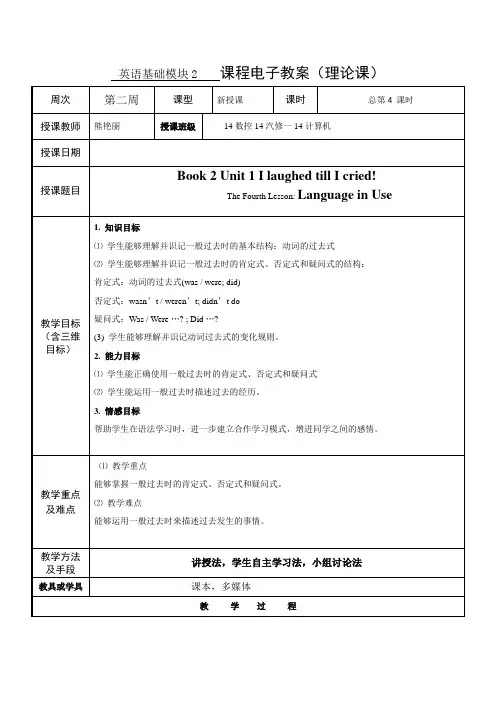
英语基础模块2课程电子教案(理论课)
(设计意图:这一游戏要求学生按照已给的例子,把其他的单词放进正确的信封中。
这里其实在复习动词的过
去式的变化规则。
而采用游戏和竞赛的方式,可以化枯燥为有趣,让学生在玩中学、做中学。
在学生把这些单词全部放入正确的位置后,可以让他们自己来归纳动词过去式的变化规则。
教师还可以在这里让学生
played
studied stopped
went da 一般直接+ed 以不发音e 结尾+d 以辅音字母+y ,则去y 加ied 重读闭音节结尾,双写最后一个字母,然后+ed
(设计意图,找出课文中的关键活动,初步理解课文。
)
3. Activity 12. Read the letters again and tick the correct sentences. Then check the answers with the Ss. See if they have any problems, help them with some important and difficult points.
Li Jie
danced
in the
classroom
last night。
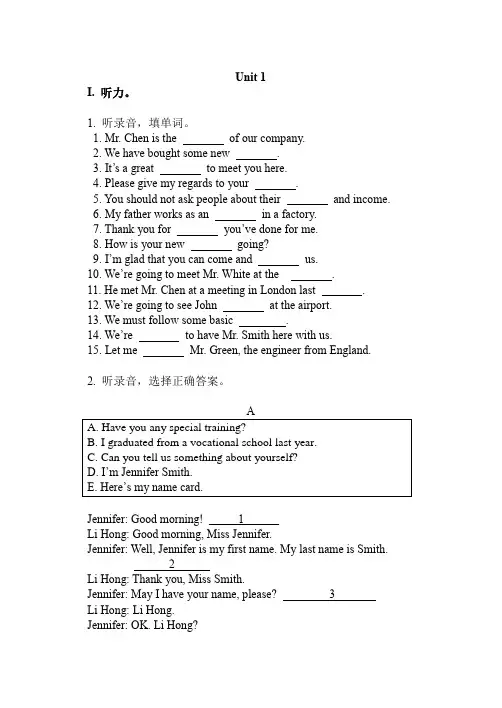
Unit 1I. 听力。
1. 听录音,填单词。
1. Mr. Chen is the of our company.2. We have bought some new .3. It’s a great to meet you here.4. Please give my regards to your .5. You should not ask people about their and income.6. My father works as an in a factory.7. Thank you for you’ve done for me.8. How is your new going?9. I’m glad that you can come and us.10. We’re going to meet Mr. White at the .11. He met Mr. Chen at a meeting in London last .12. We’re going to see John at the airport.13. We must follow some basic .14. We’re to have Mr. Smith here with us.15. Let me Mr. Green, the engineer from England. 2. 听录音,选择正确答案。
Jennifer: Good morning! 1Li Hong: Good morning, Miss Jennifer.Jennifer: Well, Jennifer is my first name. My last name is Smith.2Li Hong: Thank you, Miss Smith.Jennifer: May I have your name, please? 3Li Hong: Li Hong.Jennifer: OK. Li Hong?Li Hong: I’m nineteen and now I’m a bank clerk. But I want to be a secretary.Jennifer: I see. 4Li Hong: Yes, 5Jennifer: That’s fine. Thank you. We’ll let you know our decision later.J : What are you going to do after leaving school?D: I am thinking about becoming a guide. I would like to explore strange things.J : 1D: Of course, I do. 2J : That’s good. You seem to be good at spoken English. Is that right? D: Just so-so. I’ll try to learn it better. 3J : Maybe I’ll be a P.E. teacher. 4D: 53. 听录音,给下面句子排序。
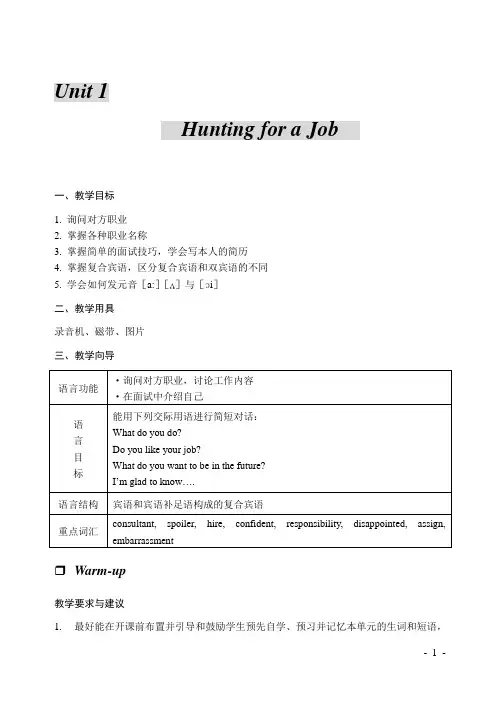
Unit 1Hunting for a Job一、教学目标1. 询问对方职业2. 掌握各种职业名称3. 掌握简单的面试技巧,学会写本人的简历4. 掌握复合宾语,区分复合宾语和双宾语的不同5. 学会如何发元音[a:][ʌ]与[ɔi]二、教学用具录音机、磁带、图片三、教学向导Warm-up教学要求与建议1.最好能在开课前布置并引导和鼓励学生预先自学、预习并记忆本单元的生词和短语,英语(基础模块)第2册教学参考书在Warm-up中涉及一些。
2.提前布置学生预习单词或在课上指导学生看图片,进行配对。
在课上引导学生根据图片记住各种职业名称,练习如何询问对方的职业。
3.分角色问答各自的职业,鼓励学生提更多有关职业的问题。
❒Pronunciation Practice教授学生练习元音[a:][ʌ]与[ɔi],同时可以多举一些常见的带有这三个元音的例子,进行对比。
❒Listening and Speaking一、教学重点根据A,B两段对话,要求学生进行模仿练习二、教学建议1. 根据课文对话来学习。
2. 并学习新的英语单词。
3. 角色扮演(Role Play)(1) 明确口语活动的任务,要求学生仔细阅读Dialogue。
必要时可做简单的对话示范。
(2) 学生成对活动,轮流作Speaker A、Speaker B。
(3) 教师巡视全班,聆听学生的对话,并解答学生提出的问题。
(4) 挑出几个学生和老师做模拟招聘会。
(5) 总结学生的表现,并及时纠正学生中出现的错误。
三、练习参考答案A Listen and fill in the blanksinterview position reasonable excited opportunity handle make good luckB2. Answer the questions(1) Lily is applying for a position of accountant.(2) Lily worked in Thomas company 4 months ago.(3) She was responsible for checking the balances, paying the bills, transferring money and soon.Unit 1 Hunting for a Job3. Complete the following sentences.(1) in her place(2) business(3) working(4) a good education.(5) white-collar4. 略5. D A A B D听力原文A2. Listen and fill in the blanks.I’m going to have an interview for a job tomorrow. It is a position in a trade company. The company offers a reasonable salary. I am very excited. It is a great opportunity for me to start my career. I think I can handle this job very well. I will make a progress if I can work in this position. But I must get this job first. So wish me good luck.B3. Complete the following sentences.(1) Could you work in her place?(2) What business are you in?(3) I’m tired of working all day.(4) He has the advantage(优势) of a good education.(5) He has a white-collar job.5. Listen to the dialogue and answer the questions.Miss Smith:Good morning, Mr. Sharp. I’m really sorry I’m late.Mr. Sharp:You’re late every morning. Miss Smith. You were late on Tuesday and yesterday. Miss Smith:But it wasn’t my mistake. I stood in the rain for an hour this morning. I waited and waited for a bus, and then when a bus came, it was full.Mr. Sharp:How about yesterday?Miss Smith:Well, I came by taxi yesterday and…Mr. Sharp:And you were still late! And the day before yesterday?Miss Smith:On Tuesday I went to see the doctor and waited for two hours there.Mr. Sharp:And tomorrow, Miss Smith.英语(基础模块)第2册教学参考书❒Language Bank教授学生练习记忆这些日常口语,也可让学生自行学习,然后课后抽查。
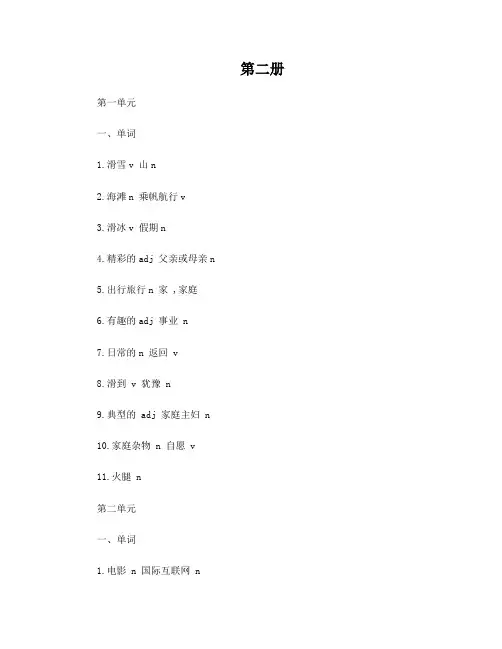
第二册第一单元一、单词1.滑雪v 山n2.海滩n 乘帆航行v3.滑冰v 假期n4.精彩的adj 父亲或母亲n5.出行旅行n 家 ,家庭6.有趣的adj 事业 n7.日常的n 返回 v8.滑到 v 犹豫 n9.典型的 adj 家庭主妇 n10.家庭杂物 n 自愿 v11.火腿 n第二单元一、单词1.电影 n 国际互联网 n2.体育馆 n 卡通片 n3.流行音乐勇敢的 adj4.伶俐的 adj 特别的 adj5.轻松的,放松的 adj. 动人的,感人的 adj6.爵士乐 n 动作电影7.恐怖电影喜剧 n8.脱口秀度过 n9.摇滚乐 n 乐队 n10.乡村音乐租用 v11.订购 v 更喜欢 v12.保持 v二、短语,句子1.你觉得电影咋样?2.在那时3.我邀请朋友一起看电影。
4.我一小时又一小时的坐在电脑前。
5.总是坐在一台机器前是浪费时间的。
6.你上周末做了什么特别的事吗?7.没什么特别的。
8.你以前喜欢什么类型的音乐?9.我曾喜欢爵士乐。
10.你过去喜欢什么类型的电影?11.我曾喜欢动作电影。
12.你通常是怎么过周末的?四.用动词的适当形式填空.cook, stay, say, tell, visit, come, think, take, be, eat1Last Sunday it was snowy. Maria 1 at home. Her cousin Cara 2 tovisit her. She came back from Beijing. She 3 Maria something about her vacation."It was pretty good," she said. Cara 4 the Palace Museum andthe Great Wall. She 5 a lot of photos.It was lunch time. Maria's parents 6 not at home. They decided to cook by themselves. Maria 7 noodles with some tomatoes and pepper (辣椒). After Cara 8 up the noodles, she said slowly, “I think it isdelicious!”But Maria 9 the food was too bad. She 10 ,“Cara, thank you, but I put too much pepper into it.第三单元一、单词1.有创造力的 adj 友好的,直爽的 adj2.自信的 adj 助手 n3.打字员 n 出纳员 n4.幼儿园 n 面试 n&v5.销售,经销 n 毕业 v6.交流 n 流利的 adj7.申请人 n 更有资格;更胜任 v8.张贴 v 广告,公告 n9.简历 n 尽早,尽快10.空闲时间 n 集体自由讨论 v二、短语,句子1.能介绍一下自己吗?2.我在一年公司兼职销售员两年了。
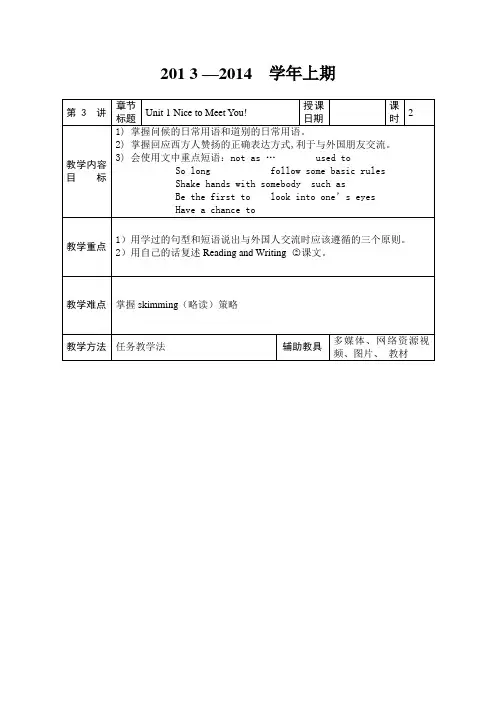
月日第 1 单元第1、2 课时总第1、2 课时(教学环节一般包括复习旧课、导入新课、讲授新课、学生操作、教师点评、归纳总结、布置作业等)月日第 1 单元第3、4 课时总第3、4 课时(教学环节一般包括复习旧课、导入新课、讲授新课、学生操作、教师点评、归纳总结、布置作业等月日第 1 单元第5、6 课时总第5、6 课时(教学环节一般包括复习旧课、导入新课、讲授新课、学生操作、教师点评、归纳总结、布置作业等)月日第 2 单元第1、2 课时总第7、8 课时(教学环节一般包括复习旧课、导入新课、讲授新课、学生操作、教师点评、归纳总结、布置作业等)月日第 2 单元第3、4 课时总第9、10 课时(教学环节一般包括复习旧课、导入新课、讲授新课、学生操作、教师点评、归纳总结、布置作业等月日第 2 单元第5、6 课时总第11、12 课时(教学环节一般包括复习旧课、导入新课、讲授新课、学生操作、教师点评、归纳总结、布置作业等)月日第 3 单元第1、2 课时总第13、14 课时(教学环节一般包括复习旧课、导入新课、讲授新课、学生操作、教师点评、归纳总结、布置作业等)月日第 3 单元第3、4 课时总第15、16 课时(教学环节一般包括复习旧课、导入新课、讲授新课、学生操作、教师点评、归纳总结、布置作业等月日第 3 单元第5、6 课时总第17、18 课时(教学环节一般包括复习旧课、导入新课、讲授新课、学生操作、教师点评、归纳总结、布置作业等)月日第 4 单元第1、2 课时总第19、20 课时(教学环节一般包括复习旧课、导入新课、讲授新课、学生操作、教师点评、归纳总结、布置作业等)教案纸月日第 4 单元第3、4 课时总第21、22 课时(教学环节一般包括复习旧课、导入新课、讲授新课、学生操作、教师点评、归纳总结、布置作业等教案纸月日第 4 单元第5、6 课时总第23、24 课时(教学环节一般包括复习旧课、导入新课、讲授新课、学生操作、教师点评、归纳总结、布置作业等)教案纸月日第 5 单元第1、2 课时总第25、26 课时(教学环节一般包括复习旧课、导入新课、讲授新课、学生操作、教师点评、归纳总结、布置作业等)教案纸月日第 5 单元第3、4 课时总第27、28 课时(教学环节一般包括复习旧课、导入新课、讲授新课、学生操作、教师点评、归纳总结、布置作业等教案纸月日第 5 单元第5、6 课时总第29、30 课时(教学环节一般包括复习旧课、导入新课、讲授新课、学生操作、教师点评、归纳总结、布置作业等)月日第 6 单元第1、2 课时总第31、32 课时(教学环节一般包括复习旧课、导入新课、讲授新课、学生操作、教师点评、归纳总结、布置作业等)月日第 6 单元第3、4 课时总第33、34 课时(教学环节一般包括复习旧课、导入新课、讲授新课、学生操作、教师点评、归纳总结、布置作业等月日第 6 单元第5、6 课时总第35、36 课时(教学环节一般包括复习旧课、导入新课、讲授新课、学生操作、教师点评、归纳总结、布置作业等)月日第7 单元第1、2 课时总第37、38 课时(教学环节一般包括复习旧课、导入新课、讲授新课、学生操作、教师点评、归纳总结、布置作业等)月日第7 单元第3、4 课时总第39、40 课时(教学环节一般包括复习旧课、导入新课、讲授新课、学生操作、教师点评、归纳总结、布置作业等月日第7 单元第5、6 课时总第41、42 课时(教学环节一般包括复习旧课、导入新课、讲授新课、学生操作、教师点评、归纳总结、布置作业等)月日第8 单元第1、2 课时总第43、44 课时(教学环节一般包括复习旧课、导入新课、讲授新课、学生操作、教师点评、归纳总结、布置作业等)月日第8 单元第3、4 课时总第45、46 课时(教学环节一般包括复习旧课、导入新课、讲授新课、学生操作、教师点评、归纳总结、布置作业等月日第8 单元第5、6 课时总第47、48 课时(教学环节一般包括复习旧课、导入新课、讲授新课、学生操作、教师点评、归纳总结、布置作业等)月日第9 单元第1、2 课时总第49、50 课时(教学环节一般包括复习旧课、导入新课、讲授新课、学生操作、教师点评、归纳总结、布置作业等)。
宁德职业技术学院教学过程与内容:Ⅰ. GreetingⅡ. Preview本单元是学生第二学期的第一单元,话题与学生的假期活动相关。
而学生刚从假期中归来,仍沉浸在假期的快乐中。
第一单元的话题非常符合学生的兴趣和当时的心情,这为本单元的学习打下了良好的基础。
第一单元的教学内容主要为:能够听懂并谈论假期中的活动;能够看懂关于家庭成员的小故事;能够描述一些已经发生过的有趣的经历;能够掌握并运用一般过去时的肯定式和否定式;能够在朗读时注意句子中的重读音节。
本单元的话题虽然亲切,教师仍然要注意运用多种教学手段,并关注每一个学生,在一些教学步骤中采用分层设计,帮助学生达成教学目标。
Ⅲ. Lead In(设计意图:把活动9的问题进行补充,多方面的问题能够让学生慢慢回忆起家庭中的各种趣事,从而会在下面的阅读中引起共鸣。
可以叫几个学生做一个简短的汇报,必定会引起其他同学的笑声不断。
本课时的教学即能在欢快轻松的氛围中展开。
)Ⅳ. Read-in1. Activity 10: fast reading. Get the Ss to read the letters as quickly as they can and tick the right topic. Then check the answer with the whole class.(设计意图,这一教学活动要求学生抓住重点,培养他们快速捕捉信息的能力。
)2. Activity 11. Read the letter again and tick the things Bob’s mother and Ben’s father did.(设计意图,找出课文中的关键活动,初步理解课文。
)3. Activity 12. Read the letters again and tick the correct sentences. Then check the answers with theSs. See if they have any problems, help them with some important and difficult points.(设计意图,通过找出正确的句子让学生进一步理解课文,同时在与学生校对答案时看他们是否存在阅读障碍,讲解重点词组。
宁德职业技术学院教学过程与内容:Ⅰ. Greeting Ⅱ. PreviewHave a comment on Ss ’ compositions. Pick out some good examples and get the Ss to read them aloud. After reading, ask some questions.(设计意图:教师对于上一课时的学生作文进行讲评,能让学生明确并及时订正自己的差错。
对于优秀作文的肯定及在全班的示范朗读,更能激发学生的自豪感,从而更主动积极地完成作业。
在朗读前,明确任务,听后要回答问题。
这样既能让听的同学更集中注意力,也有意识地培养了大家尊重他人的品质。
) Ⅲ. Lead-inTell the Ss the basic structure of the Past Tense. Ask the Ss if they know the past forms of verbs. Bb: 一般过去时: 动词的过去式(设计意图:在学生作文朗读结束后,教师告诉学生,作文中大家用来描述过去的经历要使用一般过去时。
在之前的听说课和阅读写作课中,学生们实际上已经在运用这一时态。
因此,教师在这里开门见山地提出了本课时要解决的问题。
而问题的提出:什么是动词的过去式?即在下一步骤中马上得到解决。
) Ⅳ. Contents ’ presentation Language in Use1. Game: Get the Ss to put the words into the right envelope.played danced studied stopped went cried came did read returned replied listened watched chatted had enjoyed cooked stayed gave slipped counted asked sent arrived started was were(设计意图:这一游戏要求学生按照已给的例子,把其他的单词放进正确的信封中。
Unit 1We laughed into tears!Part1: 教材分析(Analysis of the teaching material)本课时系教材《英语 2 》(基础模块高教版)第一单元的第一部分,学生听一段关于和家人度假描述的对话。
训练学生在一定的语境下用合适的方式和语句组织关于描述假期活动的对话。
Part2: 教学目标(Teaching aims)Ss can understand expression of vacation description and make a dialogue discussing vacationLead-inAsk the students where did they go and what they did in the summer vacation and winter vacation. (Group discussion and then answer my questions)Step1:Lead students read the phrases and ask Ss to tick the activities they had taken part in.then check the answer.Step2:Teacher show the pictures for the Ss , explain the requests and then play the radio for theSs. Next, teacher asks some students to answer these questions.Listening & SpeakingPart1: 教材分析(Analysis of the teaching material)本课时系教材《英语 2 》(基础模块高教版)第一单元的听力及口语第一部分,学生听一段关于 Cindy 和家人度假描述的对话。
外研版基础模块(修订版)第二册
Unit 1 Nice to meet you! 一、单元整体解读及分析
二、分课时教学设计
第一课时
Pre-listening:
头脑风暴:
We have met many familiars. Now I will introduce a new comer David to
What did we learn today?根
第二课时
While-reading:
Pre-listening:
1)对话练习:
Mr. Brown is our new foreign teacher from the US. Let’s introduce him to Ms. Xie, the assistant of our headteacher.
What key sentences or phrases they used in the dialogue?
教师把学生的回答板书在黑板
What did we learn today?
第三课时
While-reading:
2)第二遍阅读4)致欢迎辞
)信息填空②
阅读活动⑤Read and learn
Writing:
)自我信息填空
连词成句
Make sentences with your own
第四课时
While-reading:
第一遍阅读
Introduce Mark Tayor to us. If
)第二遍阅读
Introduce Lisa Wang to us. If you need, you can use
on the blackboard.
Writing:
Around the world
Pre-reading:
中国式寒暄
What do we do to greet others? While-reading:
Reading :
发音模仿:
教师播放/k/ 和/g/
频,请学生模仿。
Arrange your notebook.
作者简介:沈碧红,浙江省慈溪职业高级中学教师。
曾获第一届“外研社杯”全国中职英语教师教学技能大赛一等奖和“外研社杯”全国教学设计评比二等奖,慈溪市第九届“教坛新秀”,第六届中青年学科“骨干教师”,市先进德育工作者,第五届“十佳班主任”。